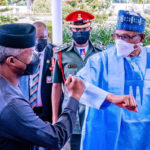Twitter’s ban in Nigeria is about to be removed, but there are certain conditions the government is asking for in order to proceed with the removal of the interdiction.
Back in June, Twitter faced blowback after taking action on a political leader’s tweets. More precisely, the social media giant removed a tweet posted by President Muhammadu Buhari. The platform claimed that the post’s removal was related to the fact that it violated its abuse policy as it was threatening to take action against secessionists who had allegedly attacked the government buildings. The authorities back then explained that the ban is related to the fact that the social media network is allegedly “undermining” the country through its action.
Now, things are about to change, and Twitter is about to come back for users and businesses who use it. The Nigerian government reports that it is close to an agreement with the social media network on resuming operations in the country. The primary condition cited by the government to accept the removal of the ban was that the platform would only be used in the country for “business and positive engagements.”
Image source: https://unsplash.com/photos/k1xf2D7jWUs
SERAP legal advocacy gets involved in the ban removal
After the government’s announcement that the social media network will be unbanned only if the social platform agrees to certain conditions, SERAP, a legal advocacy group in the country, got involved and demanded President Muhammadu Buhari and the Nigerian government to remove the imposed restrictions on the platform. Now, the advocacy group’s angry response and involvement in legal action against the ban is related to the government’s conditional approach to remove the ban.
More precisely, the SERAP group noted that it rejects the conditional lifting of the ban on the social media giant, asking President Buhari to “immediately and unconditionally” lift the illegal suspension of the platform. The advocacy group has also explained that the authorities should do so to give Nigerians back the right to freely exercise their freedom of expression.
There are many other demands made by the Nigerian government in order to agree to the removal of the ban, including assurances around national security and cohesion, registration, physical presence and representation, fair taxation, dispute resolution, and local content. As of August, the information minister Lai Mohammed reported that the social media giant has only agreed to seven of the Nigerian government’s ten demands.
Most social media networks suffering from having to bend to local laws
It isn’t just Twitter facing challenges to allow people and businesses the right to express themselves freely. Most tech giants, mainly social media networks, face such challenges due to the fine line between promoting espousing internet freedom and bending to local laws in the countries they carry on their operations. This leads to a vicious circle affecting everybody from the social media networks to their users, businesses using it, and even making virtual assistant jobs, like the ones you’ll find if you click here, more difficult with promoting online.
What’s more, in the light of the latest events related to Facebook’s all social platforms facing outage, business owners and average social media users have once again realized Twitter’s importance in the country.






